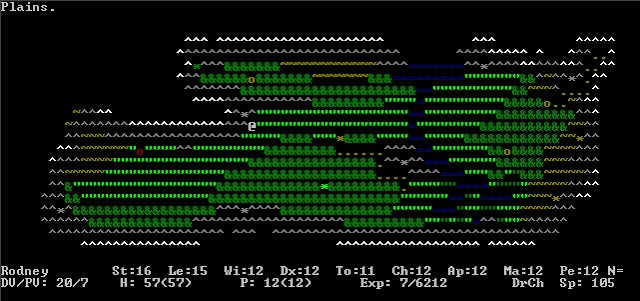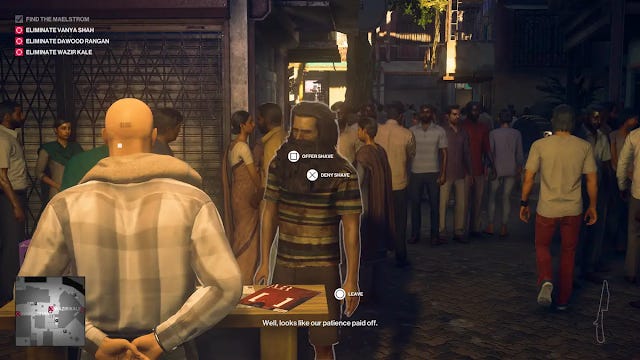This Week’s post is… well, it’s here.
First I want to talk about some videogames.
ADOM does this cool thing where the overworld is (mostly) set in stone, but all of the dungeon levels below are randomly generated. So you're improvising a lot in the dungeon, but you learn the layout and secrets of the world above.
Teardown does this cool thing where you need to, say, break into a safe and then get away, but you get unlimited time to wander around the map preparing your run, including breaking down walls and stuff. The timer only starts when you set off the alarm, typically by grabbing the thing you're stealing. If you manage that you can try again with secondary objectives to chase after. Missions also revisit maps, so you get to know them pretty well.
Outer Wilds does this cool thing where you're living out the same 22 minute time loop over and over, each time exploring the solar system and learning a bit more about each planet. It's a great feeling heading over to a planet after you've learned a few of its secrets to see how far you can get this time before the sun explodes.
Hitman does this cool thing where it has a comparatively small number of densely packed levels, and it's pretty easy to complete the mission (typically kill a couple of targets) but you're incentivised to replay each map over and over, killing the targets in new ways and exploring every corner of the map. Sometimes I just follow people around to see what they're doing.
Shenzhen I/O (and most other Zachtronics games) does this cool thing where completing each puzzle is usually straightforward, but then you're rated on various factors like cost, speed, space efficiency, so the real game is in going back to tackle the problem over and over, chasing the cheapest, fastest, or most efficient solution (typically not all three).
These are all tapping into that feeling of doing something you've already done before, but doing it a bit differently.
I don't often get that feeling when I run and play TTRPGs.
I tend to prepare dungeons with the assumption that the players will stumble through them once and then move on. Even with larger (dare I say mega-)dungeons I probably nudge players into new areas for each delve.
In my current Traveller campaign we've been playing for 9 months, jetting around The Beyond sector, a vast hexmap of space, and we haven't returned to a planet even once after leaving (though some of that may be down to the mess my players tend to leave behind them).
I feel like I'm missing out on the joy of doing something again, but doing it a bit differently.
I have an idea how I might explore that. Let's see how it pans out.
Elsewhere
Dice Goblin shows how to make religion matter in a magical world
Rise Up Comus looks at special abilities and how to write them
Playful Void explains what makes RPG books special, dropping a ridiculous amount of useful knowledge and examples with an inspiring conclusion.
A must read.
Coming Soon
Over on Patreon I talk about getting wargame players down into the cockpit of their MACs.
One of the goals of MAC Attack is to put the players in pilot view
This is where they focus in on the active unit, look at its modules, track its heat, speed, and facing, and learn to exploit the same factors in the opposing MACs. Of course you’re looking at the battlefield from a top-down view, but a big appeal of the mech genre is the nitty-gritty feel of piloting a particular machine.
This one needs to keep moving to avoid getting hit. This one runs hot if you fire all its lasers. This one needs to wait patiently for a sitting duck target. This one handles like shit over rough ground. This one absolutely must not let itself get hit in the rear.
Expect the full post here and on the blog next week.
Thanks for reading Bastionland Presser! Subscribe for free to receive new posts straight into your inbox.









Somewhere, I heard a term of "Colonialist mindset game", which meant to highlight how in most games (both video and tabletop) we usually visit a location, loot it and scrap it of its resources, and then move onto the next location. In the same context there was a term of "Gardening mindset", where you're meant to tend to the same place, nourish and improve it, get to know it better, become kinda "intimate" with it. And I've always been interested in this "garden" style of play ever since.
I think it's a great idea to try and tap into this notion of "reusing" the same material, but in such a way that would provide more depth, more understanding, and, most importantly, more care for places that we visit in our games.
Because, at the end of the day, it's easier now than ever to generate a large number of locations and characters, but it's actually the depth and the connection that provides meaning and emotion to the interaction.
Regarding your mentioning of ADOM - "Moonring" (free Ultima-Rogue-like) generates all its dungeons, it's quite impressive actually. It's a great game, rather unique.
Revisiting a place... I did this with the original 5e starter set once. I had experienced it as player, and then I put it into a campaign as an illusionary world the players were banished into. A side aspect was that one of the players was the original DM that had run the Lost Mine for us the first time. I explained to her as the player that she can use any knowledge she has about the adventure to her advantage that comes to her as a sort of past life knowledge.
The look on the faces of the players when I handed them new lv 1 character sheets alone was worth it! But it was also a lesson in how much people forget in the end and how tricky it is to act on knowledge. Also, their main goal was not beating the adventure, but figuring out the illusion and for her to spot clear deviations. (An inspiration I took from "The Sense of the Sleight-of-Hand Man: A Dreamlands Campaign for Call of Cthulhu" which I ran with limited success - still a treasure trove of a different CoC experience.)
Ah yes, one more thing comes to mind, a Lamentations of the Flame Princess adventure: "Thulian Echoes". You visit the dungeon multiple times, taking part in various expeditions with people from different times, and the progress you make in the past is a part of you clearing the dungeon at some point.
Another good variation on that is "Red Eye of Azathoth" for Call of Cthulhu. In this the whole group reincarnates. You're bound to die, pretty much, in each time period, but progressing farther in each separate episode has benefits for unraveling the overall mystery and helps you break this cycle of death and rebirth. While you do not revisit any physical location you kind of revisit the theme across multiple episodes and that also has an interesting impact.